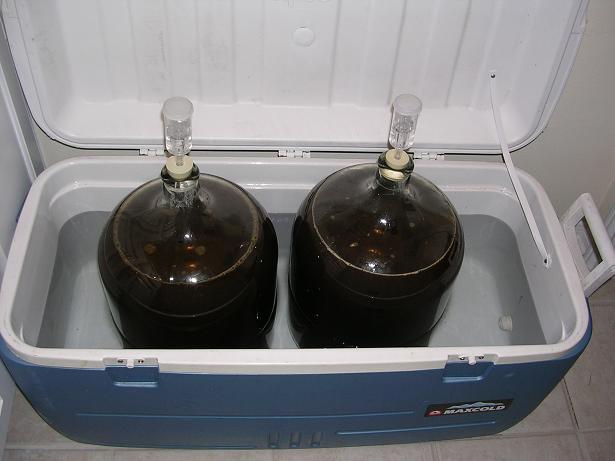Lil' Sparky
Cowboys EAC
- Recipe Type
- All Grain
- Yeast
- Nottingham
- Batch Size (Gallons)
- 5.5
- Original Gravity
- 1.055
- Final Gravity
- 1.0
- Boiling Time (Minutes)
- 60
- IBU
- 30
- Color
- 1.014
- Primary Fermentation (# of Days & Temp)
- 14 @ 68'
This is a simple, but great oatmeal stout recipe. One of my favorites!
Beer Profile
Estimated Original Gravity: 1.057 SG
Estimated Final Gravity: 1.014 SG
Estimated Color: 27.4 SRM (22.0-45.0 SRM) [Color]
Bitterness: 30.0 IBU (25.0-45.0 IBU)
Estimated Alcohol by Volume: 5.7 %
Actual Calories: 215 cal/pint
Ingredients
Amount Item Type % or IBU
9.00 lb Brewers Malt 2-Row (Briess) (1.8 SRM) Grain 72.0 %
1.50 lb Oats, Flaked (1.0 SRM) Grain 12.0 %
1.00 lb Caramel/Crystal Malt - 40L (40.0 SRM) Grain 8.0 %
0.50 lb Chocolate Malt (350.0 SRM) Grain 4.0 %
0.50 lb Roasted Barley (300.0 SRM) Grain 4.0 %
1.50 oz Goldings, East Kent [6.20%] (60 min) Hops 30.0 IBU
1 Pkgs Nottingham (Danstar #-) Yeast-Ale
Mash Profile
Name: Single Infusion, Medium Body
Mash Grain Weight: 12.50 lb
Grain Temperature: 72.0 F
Sparge Temperature: 168.0 F
Sparge Water: 4.74 gal
Name Description Step Temp Step Time
Mash In Add 15.00 qt of water at 165.3 F 153.0 F 30 min
Beer Profile
Estimated Original Gravity: 1.057 SG
Estimated Final Gravity: 1.014 SG
Estimated Color: 27.4 SRM (22.0-45.0 SRM) [Color]
Bitterness: 30.0 IBU (25.0-45.0 IBU)
Estimated Alcohol by Volume: 5.7 %
Actual Calories: 215 cal/pint
Ingredients
Amount Item Type % or IBU
9.00 lb Brewers Malt 2-Row (Briess) (1.8 SRM) Grain 72.0 %
1.50 lb Oats, Flaked (1.0 SRM) Grain 12.0 %
1.00 lb Caramel/Crystal Malt - 40L (40.0 SRM) Grain 8.0 %
0.50 lb Chocolate Malt (350.0 SRM) Grain 4.0 %
0.50 lb Roasted Barley (300.0 SRM) Grain 4.0 %
1.50 oz Goldings, East Kent [6.20%] (60 min) Hops 30.0 IBU
1 Pkgs Nottingham (Danstar #-) Yeast-Ale
Mash Profile
Name: Single Infusion, Medium Body
Mash Grain Weight: 12.50 lb
Grain Temperature: 72.0 F
Sparge Temperature: 168.0 F
Sparge Water: 4.74 gal
Name Description Step Temp Step Time
Mash In Add 15.00 qt of water at 165.3 F 153.0 F 30 min



